Related Research Articles

Cyril M. Kornbluth was an American science fiction author and a member of the Futurians. He used a variety of pen-names, including Cecil Corwin, S. D. Gottesman, Edward J. Bellin, Kenneth Falconer, Walter C. Davies, Simon Eisner, Jordan Park, Arthur Cooke, Paul Dennis Lavond, and Scott Mariner.
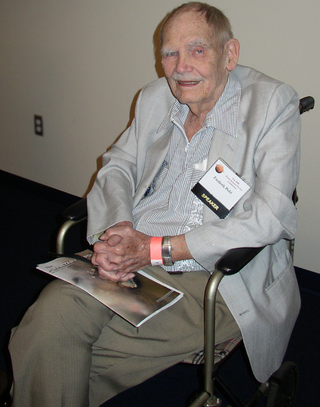
Frederik George Pohl Jr. was an American science-fiction writer, editor, and fan, with a career spanning nearly 75 years—from his first published work, the 1937 poem "Elegy to a Dead Satellite: Luna", to the 2011 novel All the Lives He Led.
Science fiction comedy or comic science fiction is a subgenre of science fiction or science fantasy that exploits the science fiction genre's conventions for comedic effect. Comic science fiction often mocks or satirizes standard science fiction conventions, concepts and tropes – such as alien invasion of Earth, interstellar travel, or futuristic technology. It can also satirize and criticize present-day society.
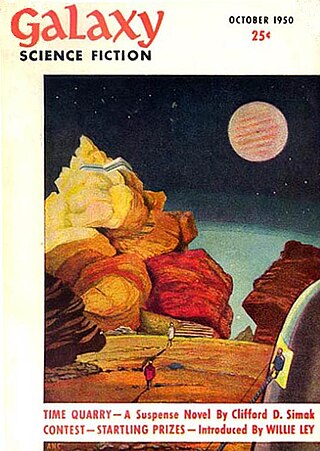
Galaxy Science Fiction was an American digest-size science fiction magazine, published in Boston from 1950 to 1980. It was founded by a French-Italian company, World Editions, which was looking to break into the American market. World Editions hired as editor H. L. Gold, who rapidly made Galaxy the leading science fiction magazine of its time, focusing on stories about social issues rather than technology.
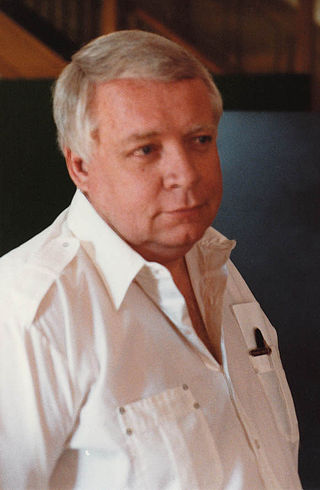
Algirdas Jonas "Algis" Budrys was a Lithuanian-American science fiction author, editor, and critic. He was also known under the pen names Frank Mason, Alger Rome in collaboration with Jerome Bixby, John A. Sentry, William Scarff, and Paul Janvier. In 1960, he authored Rogue Moon, a novel.
Lester del Rey was an American science fiction author and editor. He was the author of many books in the juvenile Winston Science Fiction series, and the editor at Del Rey Books, the fantasy and science fiction imprint of Ballantine Books, along with his fourth wife Judy-Lynn del Rey.
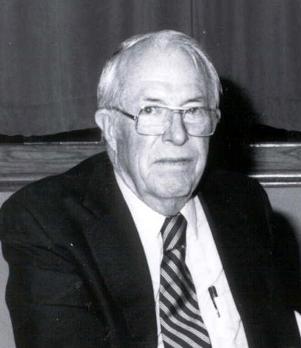
John Stewart Williamson, who wrote as Jack Williamson, was an American science fiction writer, one of several called the "Dean of Science Fiction". He is also credited with one of the first uses of the term genetic engineering. Early in his career he sometimes used the pseudonyms Will Stewart and Nils O. Sonderlund.
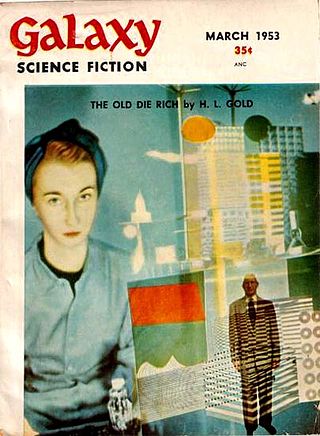
Horace Leonard Gold was an American science fiction writer and editor. Born in Canada, Gold moved to the United States at the age of two. He was most noted for bringing an innovative and fresh approach to science fiction while he was the editor of Galaxy Science Fiction, and also wrote briefly for DC Comics.

X Minus One is an American half-hour science fiction radio drama series that was broadcast from April 24, 1955, to January 9, 1958, in various timeslots on NBC. Known for high production values in adapting stories from the leading American authors of the era, X Minus One has been described as one of the finest offerings of American radio drama and one of the best science fiction series in any medium.
Betty Ballantine was an American publisher, editor, and writer. She was born during the Raj to a British colonial family. After her marriage to Ian Ballantine in 1939, she moved to New York where they created Bantam Books in 1945 and established Ballantine Books in 1952. They became freelance publishers in the 1970s. Their son, Richard, was an author and journalist specializing in cycling topics.

The Space Merchants is a 1952 science fiction novel by American writers Frederik Pohl and Cyril M. Kornbluth. Originally published in Galaxy Science Fiction magazine as a serial entitled Gravy Planet, the novel was first published as a single volume in 1953, and has sold heavily since. It deals satirically with a hyper-developed consumerism, seen through the eyes of an advertising executive. In 1984, Pohl published a sequel, The Merchants' War. In 2012, it was included in the Library of America omnibus American Science Fiction: Four Classic Novels 1953–1956. Pohl revised the original novel in 2011 with added material and more contemporary references.
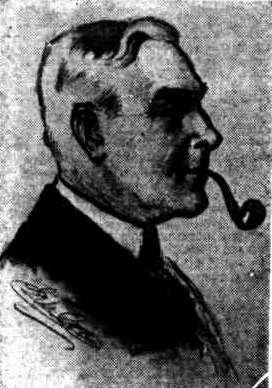
Erle Cox was an Australian journalist and science fiction writer.

Super Science Stories was an American pulp science fiction magazine published by Popular Publications from 1940 to 1943, and again from 1949 to 1951. Popular launched it under their Fictioneers imprint, which they used for magazines, paying writers less than one cent per word. Frederik Pohl was hired in late 1939, at 19 years old, to edit the magazine; he also edited Astonishing Stories, a companion science fiction publication. Pohl left in mid-1941 and Super Science Stories was given to Alden H. Norton to edit; a few months later Norton rehired Pohl as an assistant. Popular gave Pohl a very low budget, so most manuscripts submitted to Super Science Stories had already been rejected by the higher-paying magazines. This made it difficult to acquire good fiction, but Pohl was able to acquire stories for the early issues from the Futurians, a group of young science fiction fans and aspiring writers.
This article contains information about the literary events and publications of 2013.
The year 1923 was marked, in science fiction, by the following events.
The year 1925 was marked, in science fiction, by the following events.
The year 1926 was marked, in science fiction, by the following events.
The year 1929 was marked, in science fiction, by the following events.
The year 1932 was marked, in science fiction, by the following events.
The year 2013 was marked in science fiction by the following events.
References
- ↑ "Authors : Boyd, John : SFE : Science Fiction Encyclopedia". www.sf-encyclopedia.com. Retrieved 1 April 2019.
- ↑ Holland, Steve (14 November 2010). "EC Tubb obituary". The Guardian. Retrieved 1 April 2019.
- ↑ "Frederik Pohl | American author". Encyclopedia Britannica. Retrieved 1 April 2019.
- ↑ Panchasi, Roxanne (2009). Future Tense: The Culture of Anticipation in France Between the Wars . Cornell University Press. p. 10. ISBN 9780801446702.
- ↑ "Erle Cox". The Institute of Australian Culture. 31 May 2018. Retrieved 1 April 2019.
- ↑ Kaufman, Richard (December 1, 2015). "The first robot in cinema". Boing Boing.